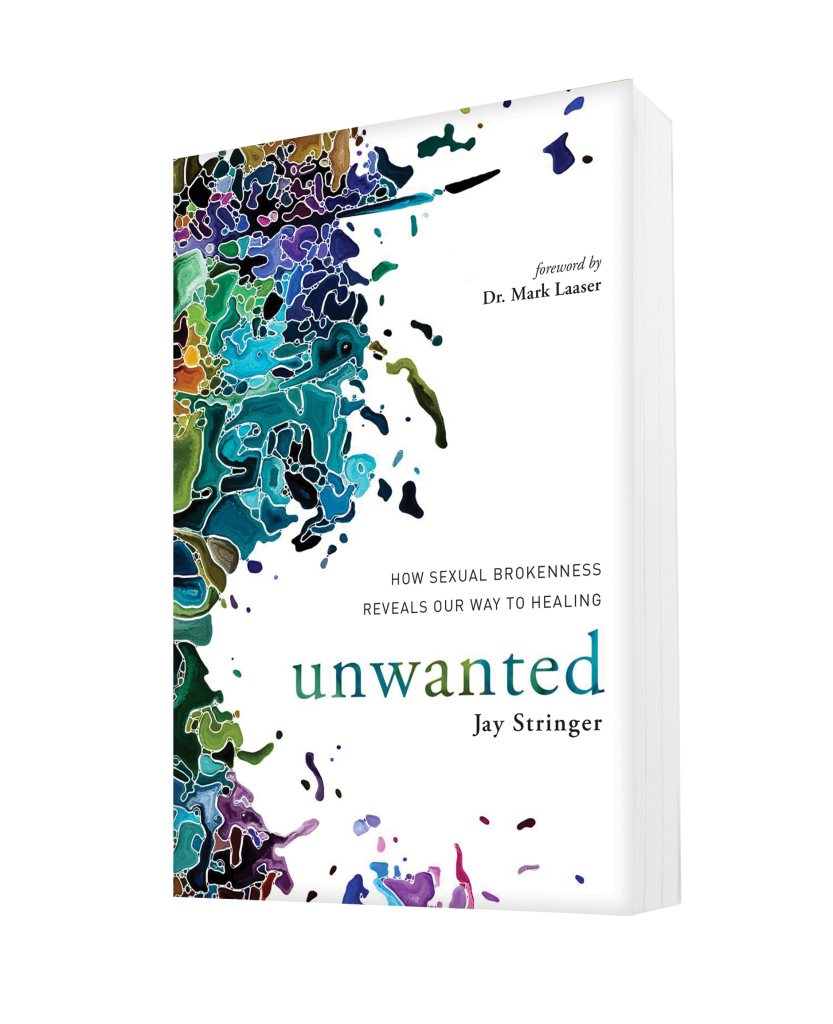If I hadn’t been caught by my wife, I think I would have been arrested at some point because the porn I started looking at was getting really horrible. – Andy
This article is the second of a three-part series excerpted from the book, Unwanted: How Our Sexual Brokenness Reveals Our Way to Healing by Jay Stringer. The content of these articles is very important, but for mature readers only.
The word perversion is taken from the Latin word pervertere, meaning to turn around.[i] When we talk about sexual perversion, we are referring to forms of sex and fantasy that have been turned around, spoiled from the original goodness God created. In Jewish tradition, a man will take the Vow of Onah on his wedding day. Marriage and family therapist Dr. Tina Sellers has noted ten instructions within this vow that are of extreme relevance to our culture today. For our discussion on perversion, let’s highlight three of these instructions related to sexual intimacy:
- Sex is considered a woman’s right, not a man’s (the husband is to ensure that all forms of sexual touch are pleasurable for her).
- Sex for selfish personal satisfaction without regard for the partner’s pleasure is wrong and considered evil.
- Sexual touch and intercourse were to be celebrated in joy and not in sadness, anger, disinterest, or self-interest.
The Vow of Onah offers a sexual ethic needed in our day. Think about what happens in our culture and marriages when sex is considered to be a man’s right, when it’s used without ensuring that all forms of sexual touch are pleasurable, or when it is used in anger or self-interest. Used in these ways, sex enters the spectrum of perversion; it turns sex away from intimacy in favor of entitlement.

Dr. Robert Stoller, who was a psychiatry professor at the University of California at Los Angeles, believed that perversion was the result of an interplay between hostility and sexual desire.[ii] Stoller theorized that pornography and other sexual fantasies are vehicles that allow childhood trauma to be transformed symbolically into sexual power. He says that pornography “at its heart is a fantasied act of revenge, condensing in itself the subject’s sexual life history—his memories, traumas, frustrations, and joys. There is always a victim no matter how disguised: no victim, no pornography.”[iii]
Perversion occurs through associating sexual lust with the anger embedded in our hearts.
Whereas lust is characterized by a frenetic desire to consume someone or something, perversion is driven by hostility. Few women and men I’ve worked with initially own the hostility in their unwanted sexual behavior. Instead, they say they are frustrated or lonely. But then they tell of being angry and upset with their partners, such as the case of a man who is angry at his partner for not wanting sex and uses porn after she falls asleep or the case of a woman who senses how devoted her husband is to his career and in response begins an affair with her husband’s college friend.
According to popular pornography sites, each time men log on to the sites, they spend on average about nine minutes using pornography. Nine minutes. Women spend about a minute more. It strikes me that if we truly longed for beauty, connection, enjoyment, and pleasure as much as people claimed, we would be spending far more time pursuing it. The evidence suggests something to the contrary. We pursue pornography not because we are pursuing beauty but precisely because we prefer to consume and control it. With time, pornography will become a form of restitution in which we demand the object of our lust to suffer the loneliness, anger, and confusion we do not know how to suffer.

Danny’s marriage was in a difficult spot when he decided to talk to his pastor about his pornography struggle. Danny’s wife had a history of sexual abuse and found herself either avoiding or disinterested in sex. He wanted to be connected to his wife but soon found that attempts to initiate sex or intimacy would be met with resistance and disappointment. “It felt easier to just turn off my desire for my wife. When I left it on, I walked around so angry at her and her past for dictating our intimacy.”
Danny managed this disappointment for several years, until his wife made the decision to go back to school. Although they had a marriage that was largely without sex, they found ways to create intimacy and diminish loneliness when they were together. All that changed when Danny’s wife started taking night classes. He found himself more depressed and as unmotivated as ever. He remarked, “I never thought it would be that hard. I would come home from work and I would be alone for three hours a couple of times a week. The old feelings returned, and the need to be connected, the desire for sex, and the anger that my marriage, which was supposed to offer these things, was completely impotent to fulfill them.” For the first time since college, Danny began using pornography.

The pornography he sought out had to do with a genre that involves younger men having sex with their friend’s mothers. The scene typically involves the man being home alone when a friend’s mom “randomly” visits him. The male actor is often lonely in the scene but aroused by the mom’s pursuit and flirtation. Danny found himself increasingly seduced by these types of videos and felt an entitled energy rise up within him to have an older woman offer him what he was missing out on. What he began to address with his pastor was the loneliness and hurt that had been present throughout his life. He wept when he saw how much his good desire for connection had been hijacked and perverted by a hostile pursuit of pornography.
If you wish to stop your perversion, learn to listen to your lust.
When you pay attention to it at a deeper level, sexual perversion can become your road map to healing. Studying the specifics of your perversion will help you gain a sense of what you are truly seeking. For example, men like Danny who develop sexual fantasies in which women hold the power—be that an attractive mother figure, an employer, or someone older—tend to have a fairly predictable story.
Danny’s path to healing involved the recognition that he did not really know who he was. His depression was a symptom of this purposelessness. He was okay when his wife was around, because her presence allowed him to avoid learning how to develop into an individuated person. He later said, “I would never want the harm of pornography to reenter my family. But oh man, it showed me so much about how little I knew who I was, how little I knew how to pursue what I needed, how little I knew how to confront difficulty. I’d never say I was grateful for it, but God sure did use it to give me a life.”
 This is the second of three articles that reveal three hijackers of our souls as it relates to unwanted sexual behavior. The content is from the book, Unwanted: How Sexual Brokenness Reveals Our Way to Healing by Jay Stringer. Get the book or learn more about Jay’s work at jay-stringer.com.
This is the second of three articles that reveal three hijackers of our souls as it relates to unwanted sexual behavior. The content is from the book, Unwanted: How Sexual Brokenness Reveals Our Way to Healing by Jay Stringer. Get the book or learn more about Jay’s work at jay-stringer.com.

[i] The American Heritage Dictionary of the English Language, 5th ed. (2018), s.v. “peevish,” accessed March 13, 2018, https://ahdictionary.com/word/search.html?q=peevish. (“Possibly from Latin perversus, turned the wrong way, perverse, past participle of pervertere, to turn around, corrupt.”)
[ii] Robert Stoller, Perversion: The Erotic Form of Hatred (London: Karnac, 1986), xi.
[iii] Stoller, Perversion, 64–65.

